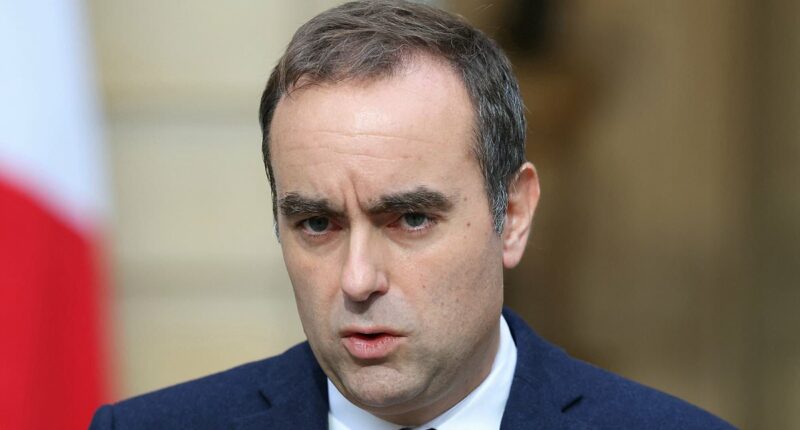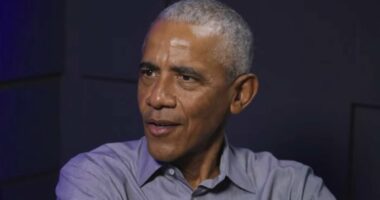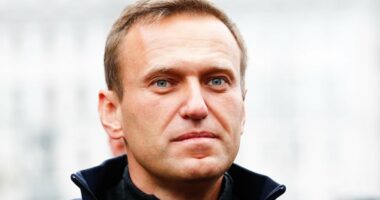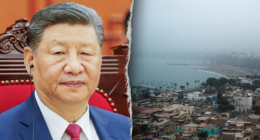Share this @internewscast.com
France’s new Prime Minister Sebastian Lecornu has quit just weeks after being appointed the position.
President Emmanuel Macron on Monday accepted Lecornu’s resignation, the Elysee Palace announced, thrusting the European nation into further political turmoil.
The resignation came just hours after Lecornu, the former armed forces minister, appointed his new cabinet.
Following weeks of discussions with political parties, Lecornu, a close ally of Macron, had appointed his ministers on Sunday, with the cabinet scheduled for its first meeting that Monday afternoon.
However, parties in the National Assembly heavily criticized Lecornu’s cabinet composition, which was largely unchanged from Bayrou’s, threatening to reject it.
Opponents and supporters alike debated its ideological stance, some arguing it leaned too far right or not far enough, raising doubts about its longevity amid France’s ongoing political crisis, with no party holding a majority in a divided parliament.
‘Mr. Sebastien Lecornu has resigned his Government to the President of the Republic, who accepted it,’ the Elysee’s press office announced on Monday morning.
French politics has been highly unstable since July 2024, when snap parliamentary elections resulted in a hung parliament.

Sebastien Lecornu, France’s new Prime Minister, resigned just weeks after his appointment. Pictured: Lecornu delivers a statement at the Hotel Matignon in Paris, on October 3, 2025, prior to consultations with political parties before the new government’s announcement.

President Emmanuel Macron on Monday accepted Lecornu’s resignation, the Elysee Palace said, plunging the European nation further into political deadlock
Macron’s decision to call a snap parliamentary election last year deepened the crisis by producing an even more fragmented parliament.
Lecornu, who was only appointed last month, was Macron’s fifth prime minister in two years following the toppling of François Bayrou and his government in a confidence vote.
Bayrou gambled that lawmakers would back his view that France must slash public spending to rein in its huge debts. Instead, they seized on the vote to gang up against the 74-year-old centrist who was appointed by Macron last December.
He had wanted to cut the equivalent of some £35billion from public spending – with national debt currently sitting at 114 per cent of GDP.
And he specifically wanted to cut two public holidays, and freeze pensions and welfare payments, while making thousands of civil servants unemployed.
Bayrou officially submitted his resignation in September after lasting just nine months in office.
Major rioting then swept across France less than 24-hoursafter Macron appointed Lecornu.
The chaos was all linked to a ‘Let’s Block Everything’ campaign ultimately aimed at forcing Macron to resign.
As the violence intensified, Bruno Retailleau, the Interior Minister in the outgoing government, said: ‘This is not a citizens’ movement in any way.
‘It’s been hijacked by the ultra-Left, and some are determined to carry out violent actions. There is an insurrectional mood.’
‘Everyone is sick of Macron, and his government,’ said Nicolas, a 19-year-old student involved in a Paris protest at the time.

Riot police forces use a water cannon to disperse protesters during a demonstration part of the ‘Let’s Block Everything’ protest movement, at the Place de la Comedie, in Montpellier, southern France, on September 10, 2025

French Riot Police stand back as Wafu Brasserie burns after catching fire during violent clashes near Chatelet in central Paris on September 10, 2025
‘The new prime minister will be as useless as the last one.’
There is no centralised leadership to ‘Block Everything’ – making it similar to the infamous but hugely effective Yellow Vest (Gilets Jaunes) movement.
The protest movement was social media based, and supported by the CGT (Confederation of General Workers), the largest trade union in the country.
Lecornu became the youngest defense minister in French history and architect of a major military buildup through 2030, spurred by Russia’s war in Ukraine.
A former conservative who joined Macron’s centrist movement in 2017, he has held posts in local governments, overseas territories and during the president’s yellow vest ‘great debate,’ where he helped manage mass anger with dialogue.
He also offered talks on autonomy during unrest in Guadeloupe in 2021.
One of his key assets for Macron was that he was not what is known in France as ‘presidentiable’, namely someone who harbours ambitions of winning the Elysee Palace for themselves.
Lecornu is ‘a loyal soldier who doesn’t have too much charisma or presidential potential,’ one ministerial adviser told AFP on condition of anonymity last month.
This is a breaking news story. More to follow.















